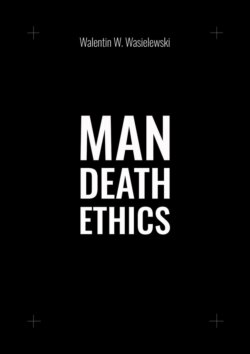Man death ethics

Реклама. ООО «ЛитРес», ИНН: 7719571260.
Оглавление
Walentin W. Wasielewski. Man death ethics
prolegomena I
prolegomena II
prolegomena III
Aristotle’s Mistake
Wittgenstein’s Guess
a source of development
a tree of knowledge
Heidegger ’s Time
a will and a mind
conclusion
the end
Отрывок из книги
1. Good and evil are not entities, but parameters. The only moral fact is death, and morality is the attitude towards death: everything that leads the system to destruction is evil; everything that overcomes the death of the system is good. The open-question argument is removed without appeal to a naturalistic fallacy.
2. All problems are linked to death. What does not lead to death is not a problem. Any obstacle, barrier, difficulty, or limit is a problem for us only if we know how it can kill us.
.....
In general, if we want to evaluate the flight as a whole, then we evaluate the ability to overcome death in the entire flight process, and not just the result of survival. Only a flight that has not had incidents and has not suffered a catastrophe will be undisputedly good for the pilot. If there was an incident in flight, even if it did not lead to a catastrophe, but just had a threat of catastrophe, then we will call this flight bad, although the result was still survival. The fact is that we knew about the risk of death in an emergency flight, which was significantly higher than in a good flight without an accident. So, we see that ethics evaluates the success of the process of overcoming death, and not the resulting survival.
Fig. 5. In the figure, survival corresponds to both the good and the not good, with an incident flight. Thus, good and evil does not correspond to survival, but rather expresses an attitude to the problem of death. This gives an assessment of not good to the flight with the incident.
.....